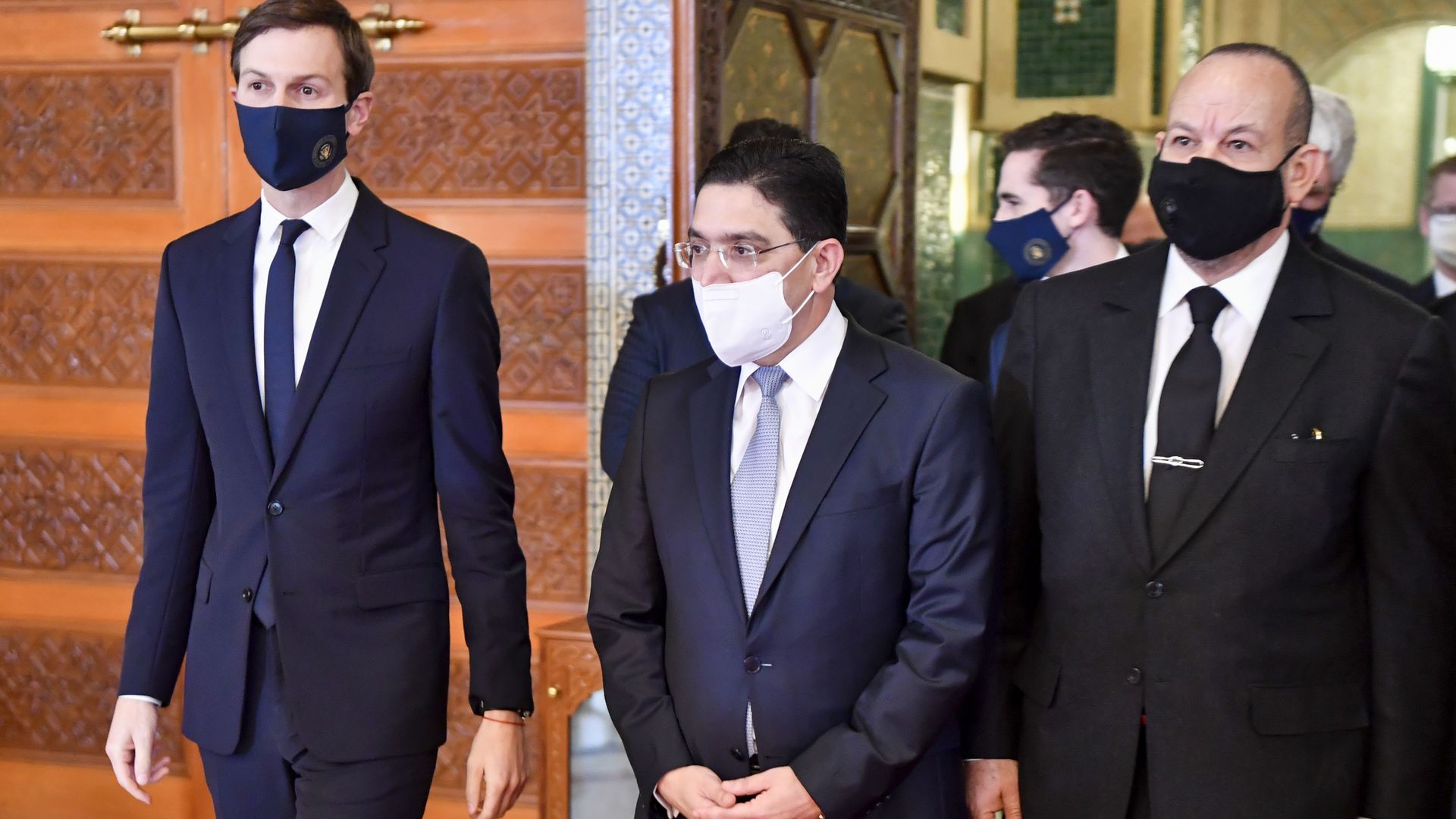Exclusive: Moroccan foreign minister urges Biden to keep Trump's deal
Add Axios as your preferred source to
see more of our stories on Google.

Bourita (C) with Kushner (L) on Tuesday in Rabat. Photo: Fadel Senna/AFP via Getty
Moroccan Foreign Minister Nasser Bourita is urging the incoming Biden administration to preserve the deal sealed by President Trump earlier this month, under which the U.S. agreed to recognize Moroccan sovereignty over Western Sahara and Morocco agreed to resume diplomatic relations with Israel.
What he's saying: "We realistically think the administration will find a good rationale to preserve this," Bourita told me in an exclusive interview on the sidelines of a trilateral U.S.-Israel-Morocco summit on Tuesday in Rabat.
“We hope the next administration will continue this positive dynamic and nourish what we have built because it was done for peace. What we have here is a package which was signed and the first commitment that everyone made was to defend, promote and upgrade this package."— Nasser Bourita to Axios
Why it matters: The U.S. recognition of Western Sahara was a controversial step that reversed decades of U.S. policy. Israel and Morocco worry that if Biden rolls it back, the rest of the deal could fall apart.
State of play: Biden didn't welcome the agreement, but he didn't criticize it either.
The other side: Bourita contended that the deal was about peace and stability in the region, and about ending two disputes that have lasted longer than they should: the Western Sahara conflict and the Arab-Israeli standoff. “We need to be end-game oriented and not process-oriented," he said.
Driving the news: On Tuesday, a U.S.-Israeli delegation led by Jared Kushner and Israeli national security adviser Meir Ben-Shabbat took a direct flight from Tel Aviv to Rabat.
- Kushner and Ben-Shabat met King Mohammed VI and signed six agreements on direct flights, investments and visas.
- Morocco and Israel committed to reopening diplomatic representation offices in Tel Aviv and Rabat in two weeks, with technical delegations from both countries set to begin that work next week.
- Both countries held onto the existing diplomatic properties since relations were severed two decades ago, recognizing that they could one day reopen, Israeli and Moroccan officials say.
Bourita told me Morocco differentiates itself from the UAE, Bahrain and Sudan — which normalized relations with Israel over the previous few months — because Morocco first established formal relations with Israel in the early 1990s.
- “We told our American friends from the beginning, 'Don’t give the same T-shirt to everyone.'"
- "We were pioneers of the relations with Israel. For us, it is a big event, but we are not building from scratch. ... It is about renewing the traditional contacts and building something which is lasting."
- “Everything is normal now — we do not plan to go only halfway here," Bourita said.
What’s next: Bourita said Morocco wants to be a bridge builder between Jews and Muslims in the region, and can also help in the Israeli-Palestinian peace process.
- “Late King Hassan II did it and King Mohammed VI is ready to do it when conditions are there and when there is a request. His majesty has credibility," Bourita said.
Worth noting: It was crucial for Morocco to pair normalization of Israel, a step that polls suggest only a tiny sliver of Moroccans support, with a far more unifying cause: recognition of Moroccan control of Western Sahara.
